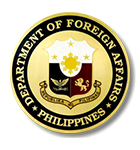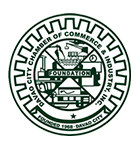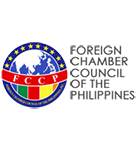Filipino Agri-Experts Talk About Role of Technology in Agriculture
Filipino agritech experts came together during the recent Agri Innovation Forum at Dusit Thani Makati, hosted by the Israel Chamber of Commerce of the Philippines (ICCP), to present agricultural initiatives and discuss how the efficient use of technology improves agricultural processes.
AGRITECH STRATEGIES
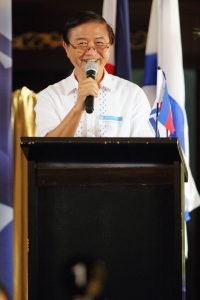 Arsenio “Toto” Barcelona, President of Harbest AgriBusiness Corp., presented the advantages of technology in attaining a successful agribusiness. His role at Harbest allows him to promote modern and feasible agricultural technologies to improve the livelihood of farmers and enhance the quality of farm produce. Barcelona cited the use of F1 hybrid seeds and agri-technology, such as the WR-801 Multi-Function Hand Tractors that can do the work of ten people, to increase farm productivity. He talked about his experience in learning natural farming from Korean, Japanese and Israeli farmers.
Arsenio “Toto” Barcelona, President of Harbest AgriBusiness Corp., presented the advantages of technology in attaining a successful agribusiness. His role at Harbest allows him to promote modern and feasible agricultural technologies to improve the livelihood of farmers and enhance the quality of farm produce. Barcelona cited the use of F1 hybrid seeds and agri-technology, such as the WR-801 Multi-Function Hand Tractors that can do the work of ten people, to increase farm productivity. He talked about his experience in learning natural farming from Korean, Japanese and Israeli farmers.
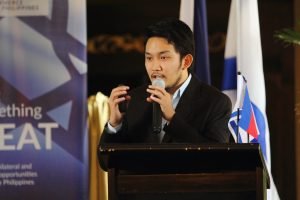 Jose Alvaro Severino Nito, who handles Programs Development for GoNegosyo, said their organization’s agri-initiatives in business and entrepreneurship aim to develop and sustain agri-business in the country. Severino cited several programs they’ve initiated, such as the weekly “ Kapatid Agri Mentor Me Program,” which allows resource persons from various areas of entrepreneurship to coach small or micro-businesses. The program already had 15 regional launches, including the “Kapatid Agri Marawi” and “Kapatid Agri Sulu,” which run a 12-week farm technical program about food self-sufficiency and sustainable agribusiness through farming cash crops.
Jose Alvaro Severino Nito, who handles Programs Development for GoNegosyo, said their organization’s agri-initiatives in business and entrepreneurship aim to develop and sustain agri-business in the country. Severino cited several programs they’ve initiated, such as the weekly “ Kapatid Agri Mentor Me Program,” which allows resource persons from various areas of entrepreneurship to coach small or micro-businesses. The program already had 15 regional launches, including the “Kapatid Agri Marawi” and “Kapatid Agri Sulu,” which run a 12-week farm technical program about food self-sufficiency and sustainable agribusiness through farming cash crops.
ROLE OF SCIENCE AND TECHNOLOGY IN PHILIPPINE AGRICULTURE
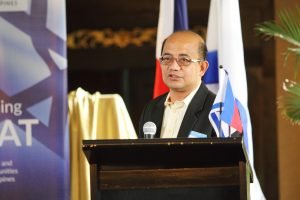 Dr. Reynaldo Ebora, Acting Executive Director of the DOST-PCAARRD, emphasized the importance of integrating science and technology in the development of agriculture, aquatic, and natural resource sectors in
Dr. Reynaldo Ebora, Acting Executive Director of the DOST-PCAARRD, emphasized the importance of integrating science and technology in the development of agriculture, aquatic, and natural resource sectors in
the Philippines. Dr. Ebora added that PCAARRD coordinates with related agencies in delivering the necessary science-based solutions to succeed in agriculture.
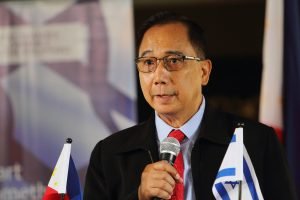 Dr. William D. Dar, the founder of the social movement for science-based agriculture InangLupa, discussed the basic challenges in the sector. Dr. Dar explained that the Philippines has the highest poverty rate in the ASEAN region due to the high rural poverty from factors such as low farm productivity, limited farmland diversification, low investment, and undeveloped agri-food manufacturing and export. These lead to low
Dr. William D. Dar, the founder of the social movement for science-based agriculture InangLupa, discussed the basic challenges in the sector. Dr. Dar explained that the Philippines has the highest poverty rate in the ASEAN region due to the high rural poverty from factors such as low farm productivity, limited farmland diversification, low investment, and undeveloped agri-food manufacturing and export. These lead to low
income and weak job creation. Dr. Dar also added the need to commercialize technologies. At present, agri-technologies are proprietary and owned mainly by the private sector. He emphasized the need to share technologies to help resource-poor, smallholder farmers.
PROSPECTS OF PHILIPPINE AGRICULTURE
ICCP President Itamar Gero quoted Emmanuel Piñol, the Secretary of the Philippine Department of Agriculture at the start of the forum by saying that the Philippines has great potential in succeeding in agriculture because of the country’s sprawling landscapes and natural resources compared to Israel, yet the farming and fishing communities are among the poorest sectors. Companies, NGOs and government agencies continue to improve Philippine agriculture through innovative practices learned from countries such as Israel. The Agri Innovation forum served as an avenue for various sectors of the agriculture industry to address issues and to create solutions
that could benefit the agriculture industry.



